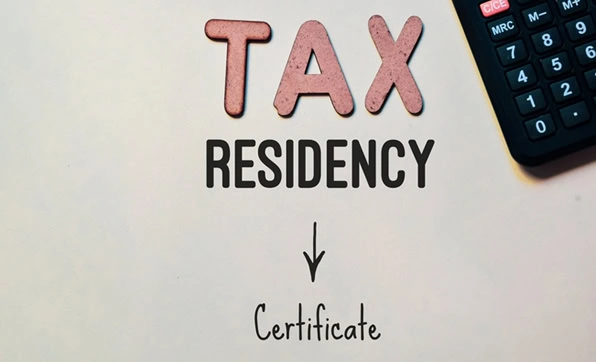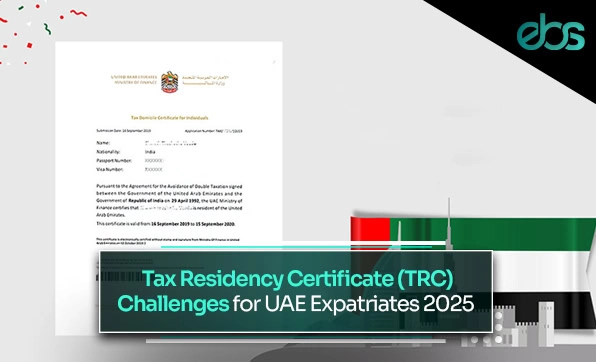In the UAE, acquiring a Tax Residency Certificate (TRC) gives expatriates several benefits, which include averting double taxation and getting access to global tax treaties. However, the application technique may be complicated and regularly ends in misunderstandings, ensuing in rejections and delays. This article will discuss the common challenges TRC when applying for a TRC, the requirements needed for a successful application and how ebs chartered accountants can assist in streamlining the process.

The Scenario
Mark, an expatriate expert living in Dubai for over two years, earns profits from investments in his domestic country. To gain from tax treaties and save you double taxation, he carried out a TRC via the UAE Federal Tax Authority (FTA). Unfortunately, his application was denied because of inadequate evidence of residency. Mark believed that simply spending over 183 days within the UAE would suffice; however, the FTA required extra documentation that he didn’t provide.
Understanding TRC Requirements
1. Proof of Residency:
- A legal Emirates ID.
- application bill payments confirming residency within the UAE.
2. Proof of Income:
- Bank statements indicating reassessment of profits.
3. Valid Visa and Passport Copies:
- Documentation of residency visa status.
Common Misconceptions About the 183-Day Rule
- Myth no.1: Staying within the UAE for over 183 days mechanically qualifies for a TRC.
Reality: The FTA mandates now no longer simply presence but additionally proof of everlasting residency ties, which includes condominium agreements or assets possession.
- Myth no.2: Owning a commercial enterprise inside the UAE ensures TRC approval.
Reality: Business possession has to be substantiated with private residency evidence, wonderful from the company’s location.
Tips for Successful TRC Applications
- Maintain Clear Documentation:
Keep copies of condominium contracts, software payments, and financial institution statements as evidence of residency.
- File Early:
Initiate the TRC application properly in advance of tax closing dates in your host country.
Consequences of Rejection
- Double Taxation: Without a TRC, Mark confronted taxes in both the UAE and his domestic country, extensively lowering his profits.
- Lost Tax Treaty Benefits: Missing out on treaty benefits can cause better tax charges on cross-border profits.
- Delays: A rejected application necessitated restarting the technique, losing time and resources.
Key Points
- The 183-day rule is the best one component of qualifying for a tax residency certificate; complete documentation is crucial.
- Consulting with experts can assist in keeping away from mistakes and steady approval on the primary attempt.
- Proactive planning guarantees that expatriates do not now miss out on vital tax treaty benefits.
How ebs Chartered Accountants in Dubai Can Assist?
ebs Chartered Accountants in Dubai gives complete economic services tailor-made for corporations and individuals. Their knowledge consists of accounting, auditing, tax advisory, and economic management. With a group of skilled experts, ebs guarantees smooth compliance and strategic making plans, supporting customers to optimize their economic operations and obtain their commercial enterprise goals.
FAQs
What is a Tax Residency Certificate (TRC)?
A TRC is a document that confirms an individual’s tax residency status in the UAE, allowing access to tax benefits and avoiding double taxation.
What documents are required to apply for a TRC in the UAE?
You need proof of residency, income, and valid visa copies, including application bills, bank statements, and rental agreements.
Does spending 183 days in the UAE guarantee TRC approval?
No, in addition to physical presence, the UAE Federal Tax Authority requires evidence of permanent residency ties, like a rental contract or owned property.
What happens if my TRC application is rejected?
A rejected application may result in double taxation and missed tax treaty benefits, leading to financial and procedural setbacks.

